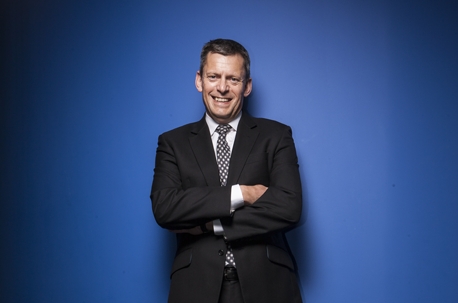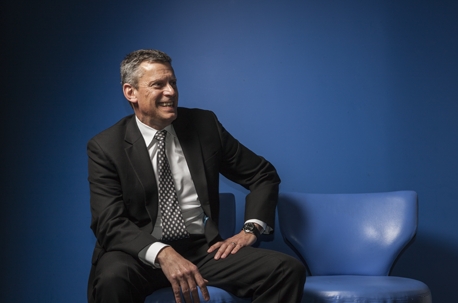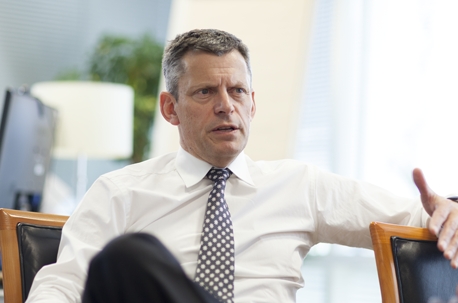FEATURE16 September 2015
Team Leader
x Sponsored content on Research Live and in Impact magazine is editorially independent.
Find out more about advertising and sponsorship.
FEATURE16 September 2015
x Sponsored content on Research Live and in Impact magazine is editorially independent.
Find out more about advertising and sponsorship.
Martin Glenn is one of the elite troupe of CMOs who moved onward and upward in business to become a CEO. Now he’s applying his commercial experience to governing football at The FA. By Jane Bainbridge

There is a pleasant narrative arc to Martin Glenn’s career to date. That the man who – in marketing circles at least – was best known for signing Gary Lineker as the face of Walkers Crisps during his tenure as marketing director, and thereby ensuring the former footballer became one of the longest running brand ambassadors in the UK, should end up leading The Football Association (FA).
The now Match of the Day presenter had certainly been Glenn’s highest profile link with football prior to him taking the helm at the FA in May. But Glenn had previous, if less starry, form with the sport. He sat as a board director at Leicester City between 2002 and 2006 and has gained the entry level football coaching qualification, not to mention being a life-long Wolves fan.
So while his career until this volte-face had been firmly fixed in the business world, it’s easy to see why the challenge of leading The FA would tempt him to step out of his commercial comfort zone and into the organisation behind our nation’s favourite sport.
“I’m incredibly proud to have been chosen to play my part in shaping the future direction of The FA. There are few more important and interesting places to work than Wembley Stadium and St. George’s Park,” says Glenn.
He, and The FA, are clearly hoping that although an outsider, his combination of business acumen with a love of the game rooted in being a genuine supporter, will help steer the organisation through its next phase.
“I hope it informs my work as we look to inspire everyone to be involved in the sport and that my experience of highly competitive global markets will help promote greater success for our national teams in international tournaments.”
And the next phase is one of lofty ambition; indeed anyone who’s followed the England team’s international form might say unrealistic ambition. For The FA chairman Greg Dyke has a stated aim of the England team winning the World Cup in 2022, with the women’s team winning it in 2023.

Not that this daunts Glenn; he’s a firm believer in needing goals to drive a business. Prior to The FA, as CEO of United Biscuits (UB), he steered the company through its acquisition by Yildiz and major brand strategy overhaul.
“What I could see,” says Glenn of taking over at UB, “was there wasn’t a clear ambition for the company; there wasn’t a three year plan.
“Your short-term results are normally better if you’ve got a good long-term strategy because you’re more consistent,” he explains.
By the time Glenn took the UB role he had secured many years of CEO experience with his stints at Walkers and Birds Eye Iglo. But the job requirements at UB were very different to Walkers he says.
“UB was fundamentally a very good business but it had sort of lost its way – it was still making great quality products and still making money – but it had got distracted. From about 2010 every year there was some outside interest to buy the business which had the effect of distracting management, putting off some longer term, knotty issues,” he explains.
High profile evidence of the changes going on at UB came in the form of some very cute kittens crawling out of a McVities digestive pack. Its emotive TV advertising campaign aimed to draw in a younger demographic to the comfort of biscuit eating.
“When I looked at the McVities/UB business, for a branded business we spent less on advertising than other big brands, as a percentage of our sales. We were about 4.5% of net sales, a typical big brand would be closer to 10%.
Unimpressed with the previous advertising, UB repitched the ad account with a brief that was essentially to get noticed and lead with a simple truth – what’s the emotional benefit of a biscuit?
And while the McVities kittens may have garnered the press attention and industry discussions, Glenn argues that its savoury campaign for Jacobs achieved just as good sales results, albeit in a less spectacular fashion. For Jacobs the direction of the advertising came from insight gleaned through research – that people didn’t realise Jacobs were baked.
However a major aspect of the UB strategy which did not come from a research-based insight was the decision to create a master brand campaign.
“No research gets you there because consumers won’t tell you. So that’s a management choice but it felt right. It had to be a campaign that could carry multiple product executions and make McVities brand grow with each execution,” he says.

Glenn’s attitude to market research is one of using it to help in decision-making where appropriate.
“All market research and psychology can do is reduce some of the risk of decisions. So when you’re dealing with selling packaged goods to millions of people, there’s a huge diversity and spread of motivations – there are some fundamental things that define us as humans, but variations within it. The people who use market research for certainty, they don’t ever do much; it can only ever reduce the risk and it can smartly reduce the risk. I do respect the patterns,” he adds.
“I’m a big believer in looking at what works; when I first went into the UB business I bought every marketer Byron Sharp’s How Brands Grow, it was forgotten basics that I was taught about the primacy of penetration over frequency.”
Although on first sight Glenn’s move to leading light in the world of football administration might seem incongruous with his previous brand jobs, his earlier roles have gone some way to preparing him for the scrutiny and politics that he will now have to weather.
For Glenn has been involved with snack food brands through a period of intense political interest, magnified by the ever increasing rates of obesity among our citizens. He may now find himself on the side of sport and health – and no doubt be glad of the respite from accusations of contributing to the excess weight of the nation – but Glenn has long been robust in the defence of the products he has marketed.
His mantra since his Walkers crisps marketing days has been that there is no unhealthy food, just unhealthy diets.
“I take it very seriously because I was in front of the House of Commons Select Committee on obesity in 2002 with the heads of Kellogg’s, Cadbury and McDonalds and asked to explain why we were making the nation fat. That’s serous, it was public.
“But out of the 75 recommendations from that committee only five were to do with calorie expenditure. To make people more aware of a calorie balance is a generational investment. It took probably 20 years of seatbelt advertising, or anti drink driving for that to be deemed antisocial, so these things take time,” he says.
Glenn is insistent that the important obesity message remains one of calorie consumption and believes a sugar tax would be unworkable.
“There is [an obesity] problem, it’s been talked about since early 2000s; yet, for all the amount of government or NGO challenge, we eat fewer calories today than we did 10/20/30 years ago. The breakup of that calorie consumption continues to shift toward grazing as people tend to extend their eating, but formal eating occasions continue to decline. The big driver isn’t consumers being concerned about obesity, they want convenience,” he says. “I think there’s a lot of ignorance about what calorie density is – calorie balance is the pivotal issue.

“If I had £5m a year, over the past ten years, to explain to people about calorie balance, I think we’d have a lot more awareness. The campaigns we’ve had like Change for Life were good ones, that’s all about balance.”
Glenn is one of the elite band of marketing professionals who have successfully risen above CMO level to lead businesses and he’s a big advocate of the skill-set marketers can bring to the top table.
“If you think what the CEO role is there to do, it’s to set the right strategy for the business, set the ambition and align people behind it. That’s quite a big emphasis on communications skills,” he says. “But anyone who becomes CEO or general manager has the generic challenge of going from being the subject matter experts.”
The FA role will now require Glenn to work in an entirely different way. He has to balance the requirements of numerous individuals and organisational bodies associated with the governance and operation of football in this country from the all-powerful Premier League and sponsorship deals to England manager Roy Hodgson’s future and the allocation of resources to coaching kids.
Time will tell if the beautiful game provides Glenn with the challenge and societal aspect of a job he was craving, and on a personal level his success may be judged on whether he can outlast the two year tenure that previous CEOs of The FA have averaged.
The full version of this article first appeared in Impact Issue 10 July 2015.
0 Comments